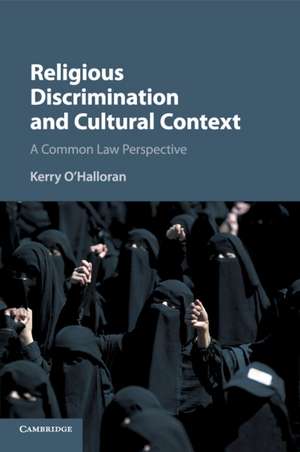Religious Discrimination and Cultural Context: A Common Law Perspective
Autor Kerry O'Halloranen Limba Engleză Paperback – 5 dec 2018
Preț: 432.05 lei
Nou
Puncte Express: 648
Preț estimativ în valută:
82.68€ • 85.83$ • 68.94£
82.68€ • 85.83$ • 68.94£
Carte tipărită la comandă
Livrare economică 25 martie-08 aprilie
Preluare comenzi: 021 569.72.76
Specificații
ISBN-13: 9781108435673
ISBN-10: 110843567X
Pagini: 566
Dimensiuni: 150 x 230 x 30 mm
Greutate: 0.75 kg
Editura: Cambridge University Press
Colecția Cambridge University Press
Locul publicării:Cambridge, United Kingdom
ISBN-10: 110843567X
Pagini: 566
Dimensiuni: 150 x 230 x 30 mm
Greutate: 0.75 kg
Editura: Cambridge University Press
Colecția Cambridge University Press
Locul publicării:Cambridge, United Kingdom
Cuprins
Part I. Background: Introduction to Part I; 1. Identity, alienation and the law: the twentieth-century legacy; 2. Religion, culture and religious discrimination; Part II. Balancing Public and Private Interests: Introduction to Part II; 3. Religion: the public and the private; 4. The international framework and themes of religious discrimination; Part III. Contemporary Religious Discrimination in Common Law Jurisdictions: The Judicial Rulings: Introduction to Part III; 5. England; 6. Ireland; 7. The US; 8. Canada; 9. Australia; 10. New Zealand; Part IV. Religion and Discrimination: An Overview: Introduction to Part III; 11. Themes of jurisdictional commonality and difference; 12. Contexting religion, culture and discrimination; Conclusion.
Recenzii
'Issues of religious discrimination - whether real or imaginary - have become ever more important in a world that is increasingly polarised between secularism and religious fundamentalism. This book is an important contribution to the debate on the 'culture wars' as viewed through the lens of some of the major multi-cultural common law jurisdictions.' Frank Cranmer, Cardiff University
'Religious Discrimination and Cultural Context tackles some of the most perplexing social issues that are facing liberal democracies today as Christianity wanes and the ISIS challenge to social cohesion grows. The laws of England and Wales, Ireland, the USA, Canada, Australia and New Zealand and their cultural context are examined in relation to the main areas of religious discrimination. The book tracks how infractions are processed through regulatory or judicial systems and considers the significance of any jurisdictional similarities or differences in the way issues are resolved. This poses questions such as: will governments be moved from a position of State neutrality to assert a positive policing role, regulating for the public benefit, in respect of religious matters? It is a thought-provoking contribution for our times.' Myles McGregor-Lowndes, Queensland University of Technology, Australia
'This book is an intriguing and challenging assessment of the ability of the law to address the problem of religious discrimination in an increasingly multicultural society. In particular, O'Halloran explores the manner in which religion and culture are frequently intertwined in ways that often result in religious discrimination becoming a means of expressing cultural animus. The so-called 'culture wars' provide the backdrop for a study of the ways in which the moral arguments advanced by its various participants often merely serve as proxies for religious or cultural discrimination. The book contains an exhaustive survey of legal prohibitions against religious discrimination across the common law world that will prove invaluable to researchers in religion, human rights and comparative law. More importantly, O'Halloran shows that the common law has not yet developed the tools to address claims of discrimination where culture and religion are intertwined. This book is an important contribution to a debate that is sure to intensify as our society becomes ever more globalised in the years to come.' Matthew Harrington, Université de Montréal, Canada
'Religious Discrimination and Cultural Context tackles some of the most perplexing social issues that are facing liberal democracies today as Christianity wanes and the ISIS challenge to social cohesion grows. The laws of England and Wales, Ireland, the USA, Canada, Australia and New Zealand and their cultural context are examined in relation to the main areas of religious discrimination. The book tracks how infractions are processed through regulatory or judicial systems and considers the significance of any jurisdictional similarities or differences in the way issues are resolved. This poses questions such as: will governments be moved from a position of State neutrality to assert a positive policing role, regulating for the public benefit, in respect of religious matters? It is a thought-provoking contribution for our times.' Myles McGregor-Lowndes, Queensland University of Technology, Australia
'This book is an intriguing and challenging assessment of the ability of the law to address the problem of religious discrimination in an increasingly multicultural society. In particular, O'Halloran explores the manner in which religion and culture are frequently intertwined in ways that often result in religious discrimination becoming a means of expressing cultural animus. The so-called 'culture wars' provide the backdrop for a study of the ways in which the moral arguments advanced by its various participants often merely serve as proxies for religious or cultural discrimination. The book contains an exhaustive survey of legal prohibitions against religious discrimination across the common law world that will prove invaluable to researchers in religion, human rights and comparative law. More importantly, O'Halloran shows that the common law has not yet developed the tools to address claims of discrimination where culture and religion are intertwined. This book is an important contribution to a debate that is sure to intensify as our society becomes ever more globalised in the years to come.' Matthew Harrington, Université de Montréal, Canada
Notă biografică
Descriere
Uses a comparative analysis of case law in leading common law nations to demonstrate how religious discrimination is culturally determined.
